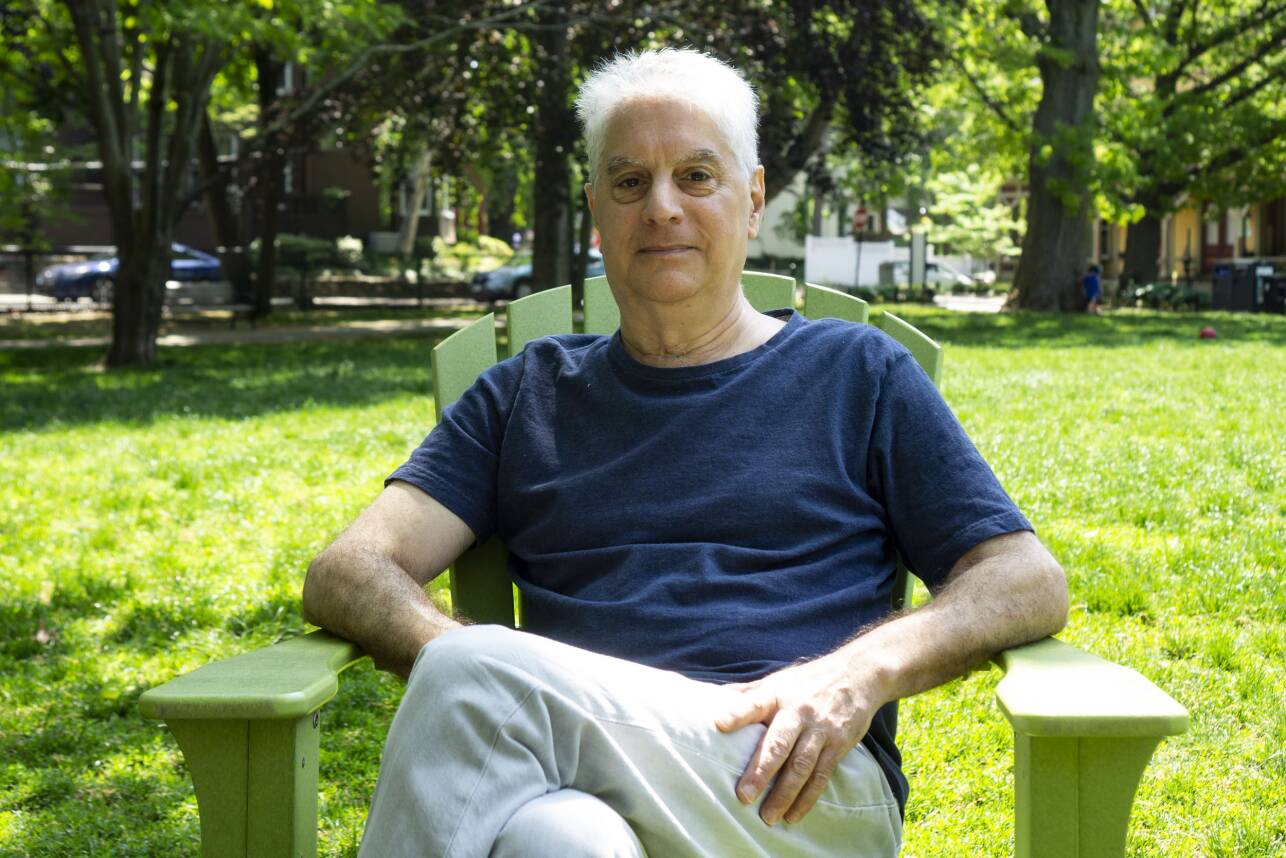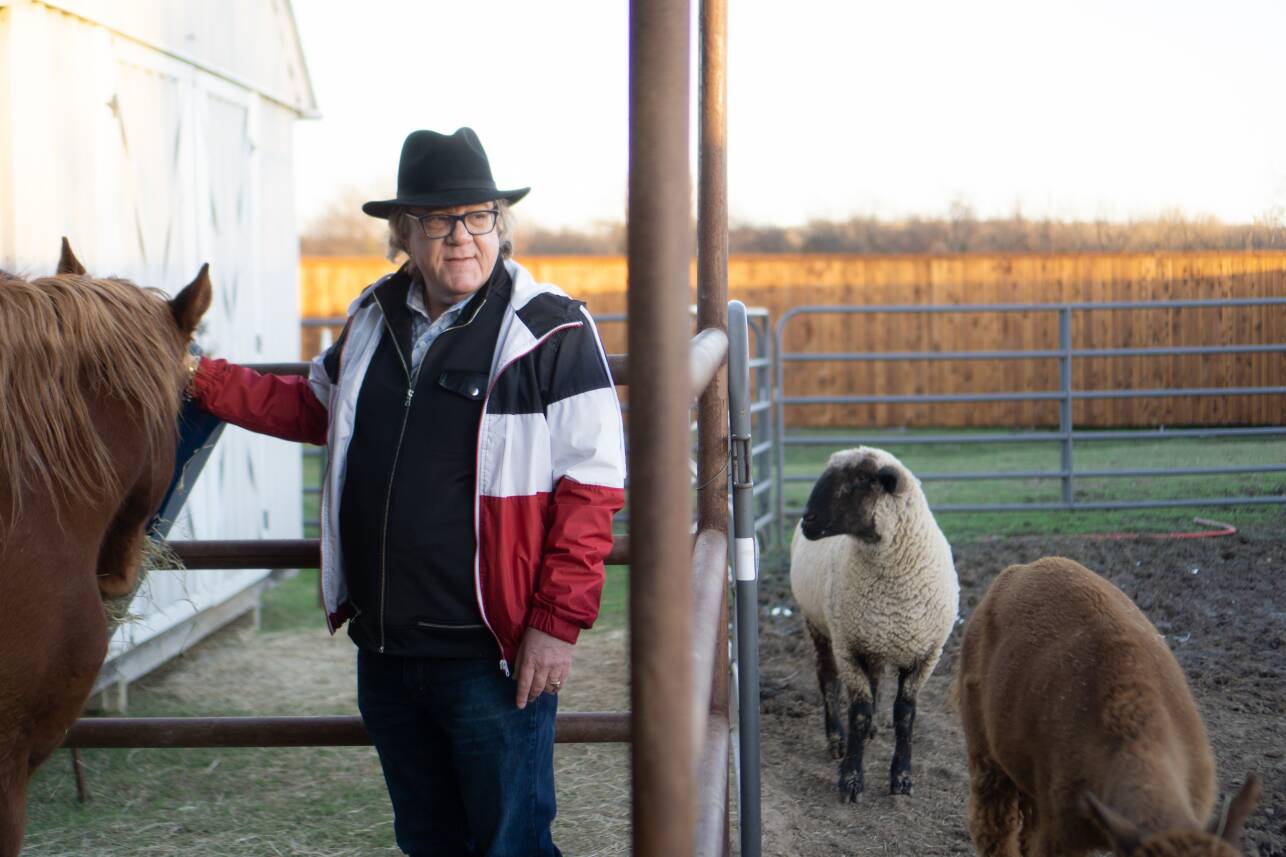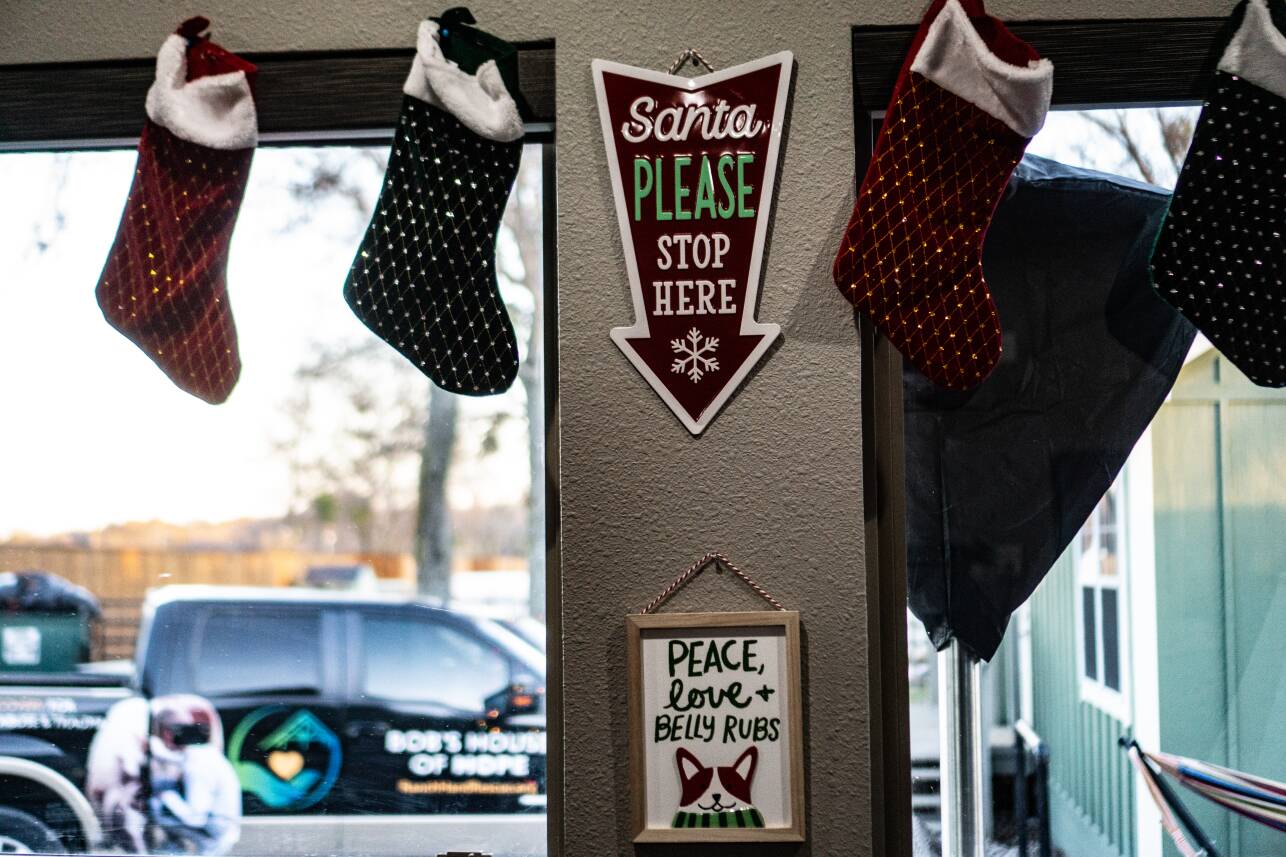DENTON, Texas — On a dusty plot of land near ranches with grazing longhorn cattle, Bob’s House of Hope serves as what is being called the country’s first safe home for sex-trafficked young men ages 18 and older.
The program – which opened in June – is one distinct, small-scale solution to address a national problem of trafficked and prostituted boys and young men, who too often go unseen and unhelped.
It’s the brainchild of Robert Williams, a bulky, straight-talking trafficking survivor, who is trying to meet that need. The home serves a handful of young men and transgender women. Last week, Williams said he’s already planning to expand. With the help of a $10 million grant from the Texas Legislature, he is purchasing another multi-acre property to increase the number of beds.
“This is an epidemic,’’ said Williams, 63. “The myth is it doesn’t happen to boys. But we know it happens to boys in every city, in every state, across this country, every day.”
Williams is the founder of a nonprofit called Ranch Hands Rescue, which connects traumatized people with abused and neglected animals as part of a therapeutic process. The safe home, surrounded by an 8-foot cedar fence, also is home to a ragtag batch of rescued animals, including a limping horse, a formerly neglected alpaca and a gaggle of once abandoned chickens.

The residents at Bob’s House of Hope have suffered acute complex trauma as a result of their abuse. As part of their recovery, they work with farm animals in a specialized program based on the concept that traumatized humans can benefit from forming connections with recovering animals with the help of licensed counselors.
“The secret formula is the animals,” Williams said. “There’s a bond that forms between the animal that’s been through abuse and neglect and the individual that’s been through abuse and neglect.”
The lack of housing is a serious problem for sex trafficking survivors. All victims lack enough resources for prevention, help and recovery. But an investigative series published this year by the GBH News Center for Investigative Reporting has shown boys, young men and LGBTQ youth fall even further under the radar because of shame, stigma and society’s unwillingness to see them as victims of trafficking.
"The myth is it doesn't happen to boys. But we know it happens to boys in every city, in every state, across this country, every day."— Robert Williams
Jose Alfaro, a 30-year-old sex trafficking survivor who now lives in Boston, said he wishes he had the opportunity to live at a place like Bob’s when he was homeless. Alfaro was trafficked as a minor and then continued in sex work as a young adult, reeling from the trauma and struggling with substance abuse and mental health issues. There are several Massachusetts organizations that provide shelter for sex trafficked or prostituted young adults, but they all serve female victims.
“It’s something that is not only needed, but necessary,’’ said Alfaro. “The majority of safe houses are for women and girls, but never have I ever heard of a place for male survivors.”
Advocates across the country are looking at the Texas shelter as a sign of growing awareness that boys, young men and LGBTQ youth are in need of help, and hope it serves as a model to others.
Sara Collins — a housing support worker for the nonprofit Being United in Leading our Destiny — said her biggest challenge is finding housing for her clients. Roxbury Youthworks’ BUILD is the only program in Massachusetts focusing solely on male, nonbinary and transgender victims of commercial sexual exploitation. For many of the people Collins helps, their only housing options are couch-surfing or homeless shelters.
“I think it should set a precedent for other states,’’ said Collins, also a life coach at BUILD. “Stable housing and stable care directed towards these youth helps stop commercial sexual exploitation.”
An increasingly vocal group of male trafficking survivors like Alfaro and William are driving efforts to increase resources for male sex trafficking victims. GBH News spoke to more than a dozen men and trans women about how they were forced into prostitution, many as minors who struggled with homelessness and addiction.
Katherine Chon, the founding director of the federal Office on Trafficking in Persons, said government officials are reacting to these stories.
“We’ve seen a lot more leadership from male survivors of trafficking with that lived experience,’’ she said. “That translated into the government being responsive.”
"This topic for trafficked boys is finally getting the recognition it needs, all the way to the federal level."— Steve Procopio
Last year, the United States Advisory Council on Human Trafficking, a survivor-lead group appointed by President Donald Trump, designated boys and young men as an “underserved” population. In its annual report, the group said males “comprise a significant portion of human trafficking victims … but there is a vast discrepancy in services available for them.”
The council also issued a “call to action” urging advocates to find “creative solutions” to meet the needs of boys and young men.
Judge Robert Lung of Colorado, who sat on the council, says he was outraged by the lack of services for boys and young men. Lung says he was trafficked by his father as a child and nobody helped him. “There should be an absolute outrage for everyone that boys are being neglected in this way and consciously being neglected,’’ he said. “There’s no housing. There’s no services. Sorry, you’re a boy.”
In response, staff in charge of trafficking-related training with the federal Office of the Administration for Children & Families brought together a group of male survivors and advocates to discuss ways to improve services and better identify victims. Last month, the training group releaseda fact sheet detailing how male victims are “often overlooked” and issued guidelines for service providers to better help victims.
“Gender-specific anti-trafficking programs, female-centric services, and awareness campaigns that use non-inclusive language and imagery can contribute to harmful stigma affecting a male’s willingness to disclose the trauma they experienced,’’ the report says. “Service providers have a responsibility to ensure males have equitable access.”
Boston-area social worker Steven Procopio, who helped draft the document, was thrilled to see the results of his work. Procopio has been working for about a decade to create more awareness about male trafficking victims, sometimes facing pushback from other advocates.
“I’m getting very emotional,’’ said Procopio, who in 2014 founded the nonprofit BUILD. “It brings to light that this topic for trafficked boys is finally getting the recognition it needs, all the way to the federal level.”

There’s no definitive data to detail numbers of trafficking or commercially sexually exploited victims in the United States. But one 2016 national study found more than a third of young people involved in the U.S. sex trade were boys and young men. That same year, a federal study found a third of male youths experiencing homelessness said they traded sex for something of value — putting their number in the thousands nationwide on any given night.
Massachusetts Attorney General Maura Healey told GBH News last week that trafficking crimes against “male, transgender, and LGBTQ victims are significantly underreported and often go undetected.” She said, “This is something that we as a state, and as a society, must work to address – through training and outreach, public awareness, and victim resources – so we can get them the support they need and deserve.”
Some anti-trafficking advocates like Nikki Bell, founder of the Worcester-based nonprofit Living in Freedom Together, offer no apologies for focusing on women’s needs first. The organization runs two shelters for prostituted women: one for women struggling with substance use and mental health disorders, and the other for those seeking immediate shelter. She says their day program welcomes boys for services but the shelters are reserved for women, including trans women. Bell, who also is a trafficking survivor, doesn’t believe studies that show a significant proportion of male victims.
“It feels sometimes like girls and women cannot even be victimized without people being like, ‘Well, what about men? What about boys?’’’ she said. “It’s an issue predominantly affecting women and girls.”
But others want to make sure all genders feel supported. The Boston-based anti-trafficking program for youth, My Life My Choice, plans on replacing its current website — featuring three women and the headline, “Her strength. Our Power” — with something gender-neutral.
Lisa Goldblatt Grace, executive director of the program, said currently only about eight of the 200 youth the program serves are cisgender boys, meaning their male gender matches the sex they were assigned at birth. About 40 percent of their youth identify as “LGBTQ plus,” she said. But the organization wants to make sure all young people feel welcome.
“We’re working really hard to ensure that all of the young people that we serve, of all gender identities, all gender expressions, feel affirmed, validated, supported, safe, getting services, choosing to get services with us,’’ she said.
Trafficked minors in Massachusetts can seek shelter through the Department of Children and Families. The state is currentlyworking to create group homes specifically tailored to exploited youth. And last spring, DCF launched trainings for social workers to help them support foster parents who may be caring for trafficked children of all genders.
But for now, there are few clear paths for help for trafficked young men in Massachusetts or across the nation. In Texas, Bob Williams wants to fill the gap.
“I was shocked that there wasn’t a facility or a safe house,” Williams said during a three-hour interview earlier this month on the Texas property he transformed from an office space to include a safe home. “I thought, I can fix that.”

Gray-haired and bestacled, wearing a black ten-gallon hat, Williams says he is taking on this project because of his lived experience.
Williams says he was raped at the age of 17 and, unable to process the pain, became addicted to drugs and homeless. He felt everything had been taken from him and he didn’t care what happened. By 20, he was trading sex for shelter. Under federal law, any child who trades sex for something of value is considered a trafficking victim. Adults are considered trafficked if they are “induced by force, fraud or coercion.”
Williams understands now that he was a trafficking victim — something he didn’t comprehend until after he changed his life around. Years later, he got clean and sober and started working for Motorola, where he eventually became a sales executive. In 2007, he suffered a stroke and retired.
Williams was inspired to help animals, and later people, after coming across a goat stuck in a cage at an open-air market, unable to walk or turn around. Concerned about its welfare, he purchased it for $60. He placed the goat in the back seat of his Cadillac and brought it home.
He said he told the story to one of his closest friends, now deceased actress and philanthropist Doris Roberts, best known for her work on the TV show “Everybody Loves Raymond.” Roberts helped him raise money to create an animal sanctuary. As Williams cared for a growing crew of recovering farm animals, he found his own health was getting better.
“I would say to Doris, ‘These animals are having an impact on me, they’re helping me,’’’ he said. “So I wanted to design a program for people.”
He lobbied mental health professionals to help him. For months, he was told his plan wouldn’t work, that healthy animals were the only answer. Eventually, he persuaded a local counselor and an advocacy agency to bring a pilot group of troubled children to interact with his traumatized animals — and they were encouraged by the results. Ranch Hands Rescue was officially incorporated in 2009 and now boasts that it has cared for 579 animals and 1,710 clients, including trafficked boys, girls and veterans.
Roberts, who died in 2016, was an avid supporter of his fundraising efforts. “It’s a new way of life for these children and these animals,’’ she said tearfully in a short promotional film from 2014. “Let’s help them make it a wonderful life.’’
When Williams decided to create a residential program, he said he first thought of veterans. But then, he said, he realized through conversations and research that trafficked young men had nowhere to go. When Ranch Hands Rescue staff began working from home because of the pandemic, he realized he could convert the organization’s headquarters into a safe home.
He said there’s an appalling lack of data on trafficking numbers altogether. Women and girls also need more help, he said, “But the reality is that somebody’s got to do something about the boys.”
Recently, residents, staff and volunteers at Bob’s House of Hope helped decorate a Christmas tree, hang stockings and put up other holiday decorations. A sign reading, “Santa please stop here,” hangs on the wall.

Williams introduced a reporter to several of the residents, asking two of them to show off their singing abilities, while protecting their anonymity due to fear of the men who trafficked them.
Landon Dickeson, director of clinical services at the home, said organizers are learning every day how to better do their work. It isn’t enough to replicate what happens at women’s shelters, he said. For one thing, the clients at Bob’s eat a lot more.
Residents also struggle with mental illness, substance abuse, health issues and trust deficiencies. Not one has more than a seventh-grade education. They have serious dental care needs and most hoard food, unaccustomed to a plentiful kitchen. But every once in a while, there is song, there is laughter, and there is hope for self-sustaining lives.
“I want my focus to be helping people recover from complex trauma — not just trauma, not just PTSD, but complex PTSD — and those who have tried everything else and still not gotten better,’’ Dickeson said. “What more can you ask for? People helping animals, animals helping people? That’s perfect.”
With his multi-acre purchase, Williams is planning to accommodate more trafficking survivors. He said he could use 20 more beds today. He knows it won’t solve the national trafficking problem. The country also needs to better educate people about trafficking and hold traffickers and sex buyers accountable.
Until then, Bob’s House of Hope wants to be a beacon for those who need help.
“I knew if we built it, they would come, and we can’t even keep up with the calls,’’ Williams said. “My goal is to eventually be able to take young men from anywhere in the world.”





